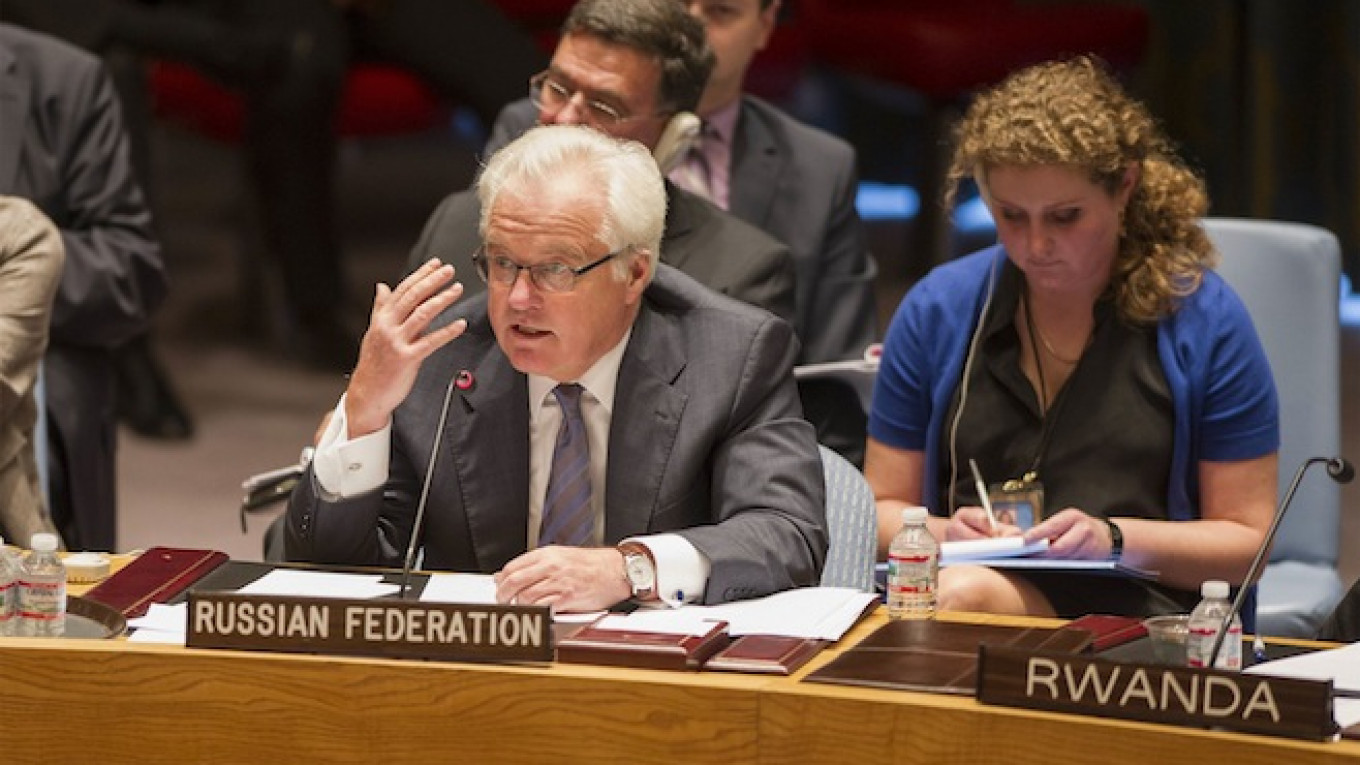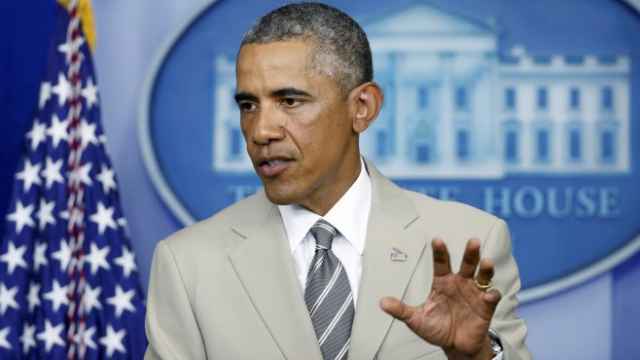UNITED NATIONS — As the West lined up to condemn Russia for what Ukraine has called "an invasion" of its eastern regions, Russia at the UN Security Council urged it to keep out of its "close relations" with its neighbor in a show of increasing frustration that dimmed hopes for a diplomatic solution.
At an emergency session of the UN Security Council convened on Thursday in the wake of reports about Russian military forces pouring into Ukraine, Russian Ambassador to the UN Vitaly Churkin dismissed Western interference and admonished its former Soviet subordinate.
Any Western advisers who pushed Ukraine into demanding that separatists lay down their weapons, "either did not understand what they were doing, or they were just provocateurs seeking to completely destabilize the situation in Ukraine and to spite Russia," Churkin said.
A peace plan that Ukrainian President Petro Poroshenko had proposed earlier this week called for a ceasefire that "absolutely must be bilateral in character," as Kiev argues that its unilateral ceasefire earlier this year was a failure. But Moscow maintains that Kiev should make concessions to separatists before it can ask them to end the insurgency.
Churkin's statements at Thursday's meeting appeared to suggest the Kremlin continues to see Ukraine as its Soviet-style dependent and protege, swayed off course by seditious U.S. influence.
In a direct appeal to Ukraine's deputy representative to the UN Oleksandr Pavlichenko, Churkin said that, unlike Western governments, "you and I know our region" and understand the "close relations" between the two countries.
He demanded answers from Washington about "what dozens of American consultants are doing in the building of Ukraine's security and defense council," — a statement that reiterated Russia's accusation that Ukraine is being led by outside interests.
Safety Corridor
Shortly after Churkin's speech at the Security Council and in the early hours of Friday, Moscow time, the Kremlin published a direct address from Russian President Vladimir Putin to separatists in "Novorossiya" — a tsarist-era term that means "New Russia."
In the address published on the Kremlin website, Putin praised the "significant success" of the separatist "resistance" on the battlefield but asked rebels to provide a "humanitarian corridor" for encircled Ukrainian troops to withdraw safely.
Insurgents have started to take over territories that could provide Russia with a landconnection to Crimea — a rebel advance that Ukraine and the West said was aided by Russian troops actively joining the conflict.
In a sign that Moscow is unlikely to end its involvement in Ukraine, Deputy Foreign Minister Sergei Ryabkov also stressed Ukraine's Soviet-era links to Russia during an interview published Thursday, and warned against trying to drive a wedge between the former allies.
Ryabkov accused the U.S. of seeking "to prevent in any way the consolidation of the post-Soviet space, to prevent people who live in various parts of this vast region, who feel some kind of spiritual, historical, personal ties with Russia, from realizing their hopes," according to an interview published on the Foreign Ministry's website Thursday.
"How Many More Red Lines?"
The Security Council meeting appeared to have ended with an impasse — Ukrainian and Western envoys denounced Russia for stepping up its alleged interference, and Churkin insistently cast Moscow as a sole peacekeeper.
U.S. Ambassador Samantha Power said the council's meeting Thursday marked its "24th session to try to rein in Russia's aggressive acts in Ukraine."
"Every single one of those sessions has sent a straightforward, unified message: Russia, stop this conflict. Russia is not listening," she said.
Ukraine's Pavlichenko expressed frustration with the apparent futility of past appeals to Russia, and urged the West to take stronger action.
"How many more red lines are to be crossed before this challenge is addressed?" Pavlichenko asked the council.
British Ambassador Mark Lyall Grant said recent events have shown "a clear pattern of escalating Russian military involvement in eastern Ukraine."
"Russia can no longer pretend that it is not a direct party to this conflict. Indeed, this conflict would no longer exist without direct Russian military involvement and support of the separatists," Grant said. "Violating international law and the UN Charter in such a brazen manner is not compatible with Russia's responsibilities as a permanent member of the Security Council."
But Churkin insisted that peace would return if the West left Russia and Ukraine to settle their disputes.
"With the support and under the influence of a certain array of states, Kiev authorities have torpedoed all political agreements for resolving the crisis in Ukraine," Churkin told the council.
"Stop interfering in internal affairs of sovereign states," he said.
Russia persistently denies the presence of its military troops in Ukraine, saying that the Russians fighting alongside separatists are "volunteers" — a claim that Western members of the Security Council said Thursday resembled Moscow's rhetoric preceding its annexation of Crimea.
"At every step, Russia has come before this council to say everything except the truth," Power said.
A Message from The Moscow Times:
Dear readers,
We are facing unprecedented challenges. Russia's Prosecutor General's Office has designated The Moscow Times as an "undesirable" organization, criminalizing our work and putting our staff at risk of prosecution. This follows our earlier unjust labeling as a "foreign agent."
These actions are direct attempts to silence independent journalism in Russia. The authorities claim our work "discredits the decisions of the Russian leadership." We see things differently: we strive to provide accurate, unbiased reporting on Russia.
We, the journalists of The Moscow Times, refuse to be silenced. But to continue our work, we need your help.
Your support, no matter how small, makes a world of difference. If you can, please support us monthly starting from just $2. It's quick to set up, and every contribution makes a significant impact.
By supporting The Moscow Times, you're defending open, independent journalism in the face of repression. Thank you for standing with us.
Remind me later.






